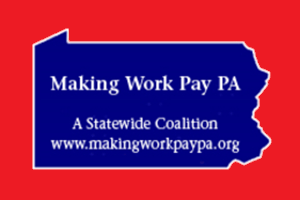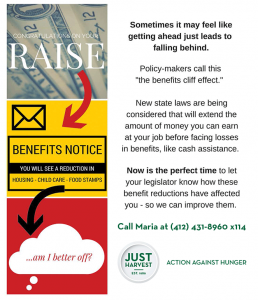 Just Harvest has joined a group of 27 advocacy and direct service organizations from across Pennsylvania that are coming together to help working families.
Just Harvest has joined a group of 27 advocacy and direct service organizations from across Pennsylvania that are coming together to help working families.
The Making Work Pay PA Coalition aims to advance better state policies that will support low-income families as they transition from government support into the workplace and help them obtain true financial self-sufficiency. Towards this end, the coalition has released a series of recommendations related to the needs of low-income families in Pennsylvania.
“Ensuring that families keep the money they earn is critical to improving well-being in Pennsylvania,” said Tam St. Claire, Bucks County Women’s Advocacy Coalition (BCWAC) president. “BCWAC is pleased to be a leading convener in such a worthwhile effort, and looks forward to working with WOMEN’S WAY and other organizations on these recommendations.”
The Making Work Pay PA Coalition recommendations will improve family sustaining programs and make them work more efficiently. These recommendations include, but are not limited to:
- Eliminating asset tests for Temporary Assistance for Needy Families (TANF) program and the Supplemental Nutrition Assistance Program (SNAP/food stamps)
- Establishing a statewide Earned Income Tax Credit (EITC)
- Increasing the income limit for families participating in Pennsylvania’s subsidized child care program
- Increasing the state minimum wage to $10.10 per hour and eliminating the tipped minimum wage, which is currently $2.83 per hour.
- Increasing the Earned Income Disregard in the TANF program and making the change available to both current recipients and applicants.
(The entire list of recommendations can be viewed on the coalition’s website.)
“Asset tests for TANF and SNAP sends the wrong message to families, essentially discouraging them from saving money for emergency needs, from having a reliable car needed for transportation to work, or from putting money aside for the education of their children. If we want working families to move forward, we should encourage and allow them to accumulate resources to build a better future for themselves,” said Peter Zurflieh, attorney at Community Justice Project.
Evelyn Dodds of Philadelphia Unemployment Project added, “There is also no better way to make work pay by making sure people get a fair wage to begin with. Increasing the minimum wage to $10.10 per hour would boost annual full-time earnings of minimum wage workers by $5,700 enough to pull a family of three out of poverty. Two thirds of minimum wage workers are women.”
“One powerful way Pennsylvania can help make work pay is to establish a state Earned Income Tax Credit,” said Mike Wood of the Pennsylvania Budget and Policy Center. “Coupled with the federal program, a state EITC can make a great difference in the lives of working families. PA should join the 25 other states that have adopted state EITCs.”
The next step for the coalition will be coordinating a statewide listening tour to share information and gather stories with community organizations and representatives.
Get Involved
 Are you a working person trying to move off of government assistance? It’s not easy, is it? Having a job requires all kinds of costs – clothing, child care, transportation – that your wages may not cover.
Are you a working person trying to move off of government assistance? It’s not easy, is it? Having a job requires all kinds of costs – clothing, child care, transportation – that your wages may not cover.
Have you encountered first-hand how getting ahead sometimes just leads to falling behind? We want to hear from you!




No comments yet.